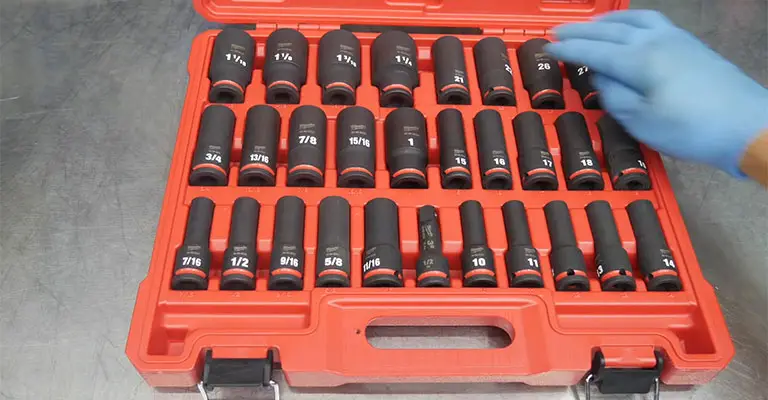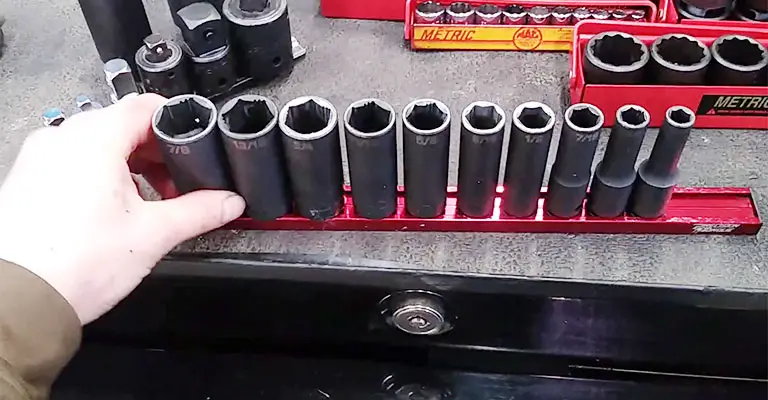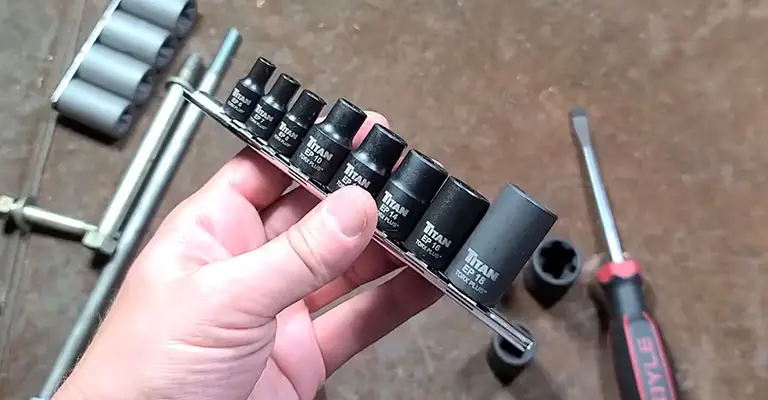The short answer is “no”. Use impact sockets with impact wrenches. If there are no options, you can use a regular socket with an impact wrench in tightening operation, but obviously with caution. Because they are significantly different in the material used, applied torque range, structure, and efficiency.

Can You Use Regular Sockets on an Impact Wrench?
Nothing can beat the power of an impact wrench while removing a big or heavily rusted nut. Everyone likes to keep one in their collection, but most people face difficulties in the beginning while choosing the appropriate socket for it. Therefore, a common question arises, “Can you use regular sockets on an impact wrench?”
Impact wrenches can loosen rusted nuts easily. This becomes possible because an impact wrench uses a hammering mechanism instead of human strength. There is a small set of hammers inside the tool, that strikes to create a rotational force when the trigger is pulled to turn a nut or a socket.
There are various types of sockets out there, those can be divided into two categories – impact sockets and regular sockets. Impact sockets are designed to be used in impact wrenches. Hence, it is recommended to use them instead of regular ones with an impact wrench.
Why Can’t You Use Regular Sockets on an Impact Wrench?

Impact sockets have to withstand varying levels of force. The impact of the hammers and the rotational force applied to the socket requires them to be structurally rigid. Besides they need to ensure safety to a certain degree which a regular socket isn’t capable of.
Factors like the ability to withstand higher torque, comparatively thicker body structure, and certain material properties separate the impact sockets from the regular ones. Hence you cannot use a regular socket with an impact wrench and expect the same level of efficiency and safety. Let’s take a look at some more details about this topic.
Material Properties
Regular and impact sockets have different material properties. Most regular sockets have a chrome vanadium finish, whereas, impact sockets are made with chrome molybdenum steel, and then they are carbonized. This makes the impact sockets achieve high tensile and ductile properties.
Molybdenum can endure more impact and vibrations than vanadium. Therefore, the repeated impact of the hammers doesn’t crack or split the sockets easily. The carbonization also increases the overall strength of the metal. On the other hand, vanadium has low tensile strength. So, it may break under high impact and rotational force.
Applied Torque

We need torque to tighten or loosen a nut. Torque is the product of force and length. To produce higher torque, either force or length or both needs to be increased. Impact wrenches cannot increase the length, so they produce higher forces with a set of small hammers to deliver higher torque.
There are two types of torque applied on a nut operation – tightening torque and breakaway torque. Typically, the breakaway torque is higher than the tightening torque because more torque is needed to loosen a nut. Hence, if a regular socket is used in an impact wrench, there is a possibility that the socket will break while applying breakaway torque.
Body Structure

When you compare both sockets side by side, you will easily notice the difference in the body structure of the sockets. Impact sockets are designed to handle higher impact loads, so they have thick walls. In opposition, regular sockets have relatively thin walls and weigh lighter.
Regular sockets are circular while impact sockets have a unique design that allows them to resist higher rotational force and vibrations. Besides, impact sockets are longer than regular sockets. This is why regular sockets are not capable of handling such higher torque and impacts as impact sockets.
Safety
When it comes to safety concerns, it is highly recommended not to use a regular socket with an impact wrench. As stated before, regular sockets have low tensile strength due to their structure and materials. So, when subjected to high impact rates and torque, it can crack or get damaged.
If subjected to extreme impact force and torque, a regular socket can break and shatter into flying pieces that can hurt you severely. Hence, even if you can fit a regular socket in an impact wrench, don’t go for it.
Efficiency
As a regular socket can break easily under high impact and rotational force, you cannot use an impact wrench at its full efficiency while a regular socket is attached to it. Applying higher torque can break the nut or the socket itself.
To use your impact wrench at its maximum efficiency, use an impact socket with it.
What Kind of Sockets Do You Use With an Impact Wrench
Impact sockets are designed to use with impact wrenches. These sockets are sturdy and have high tensile strength. Impact wrenches can deliver higher torque than other wrenches while tightening or loosening a nut. These wrenches have a hammering mechanism that helps to create such rotational force.
Impact sockets are built to encounter higher torque delivered by the impact wrenches. These sockets have better durability and tolerance to greater impact load.
What Is the Difference Between an Impact Socket and a Regular Socket
Regular sockets are made of chrome vanadium. These sockets are lightweight and have thin walls. Hence, these sockets are vulnerable to high impact rates and torque.
On the contrary, impact sockets are made of chrome molybdenum and then carbonized. Chrome molybdenum has high ductility and durability. Besides, it has great tensile strength. These sockets have relatively thick walls and weigh heavier than the regular ones. As a result, impact sockets can resist better impact and torque.
Why Are Impact Sockets Black
Impact sockets are made of chrome molybdenum steel instead of chrome vanadium. Then these sockets are carbonized, which gives them a uniform black look.
How Do I Attach a Socket to an Impact Wrench
To attach a socket to an impact wrench, follow these steps:
- First, find an appropriate socket for your wrench. Different nuts have different sizes. So, the socket should match the nut’s size and head shape too.
- Then turn off the reverse setting of the wrench and turn on the forward setting.
- After that, put the square-shaped end of the socket on the shaft of the wrench.
- Lastly, pull the trigger of the wrench till you hear a snapping sound.
You should be good to start working with your impact wrench.
Bottom Line
Even when it is possible to use a regular socket on an impact wrench, you should avoid it. To ensure your safety and achieve maximum efficiency, it is highly recommended to use impact sockets. Especially, avoid using it in breakaway operations at any cost, especially if the nut is frozen and rusty.
Leave a Reply